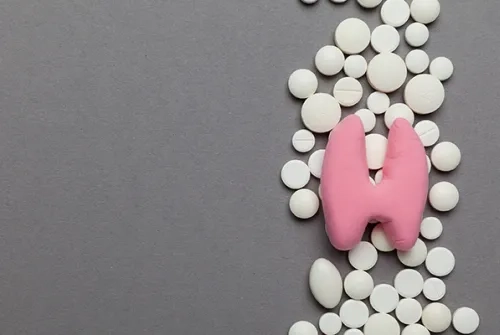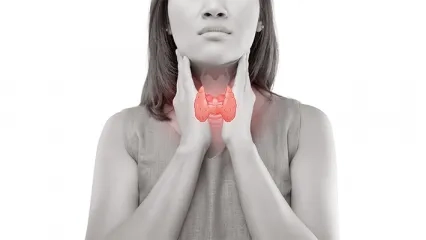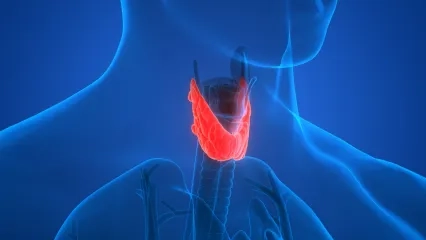Alo Yeditepe
Alo Yeditepe
Stress Triggers Thyroid Diseases; These Occupations Are At Risk!
Drawing attention to the fact that stress, which is a disease of age, triggers thyroid diseases, Endocrine Surgery Specialist Prof. Dr. Erhan Ayşan said, “Those in the finance, banking, economic sector, and doctors are at risk. Stress can initiate all endocrine diseases, especially thyroid. The important thing is to manage the process well.”
Everything that is struggling in daily life, such as traffic, crowded, busy work pace, and problematic bilateral relationships, triggers stress. Yeditepe University Koşuyolu Hospital Endocrine Surgery Specialist Prof. Dr. Erhan Ayşan made important statements. Stating that all endocrine organs, especially the thyroid, ovaries, and breast in women, and the prostate gland in men are affected very much by stress, Prof. Dr. Erhan Ayşan gave the following information: “Hormones T3 and T4 are secreted from the thyroid gland and stress disrupts the secretory rhythm of these hormones. Excess hormone secretion is reflected in our daily lives as anxiety, sweating, weight loss, and sleep disorders. In case of insufficient hormone secretion, the patient may gain weight, and experience weakness, fatigue, reluctance, depression, excessive sleep desire, constipation, and swelling. Hair loss and dry skin are also the results of disruption of the hormonal secretion rhythm caused by stress.”
More Common In Women
Stating that stress-related thyroid diseases are more common in women, Prof. Dr. Ayşan said, “The presence of additional diseases such as advanced age, heart, blood pressure, diabetes can also cause it to be affected more. We see this more often in women. This is thought to be because women's hormonal and emotional structures are different from men's. This structure is also reflected in the thyroid, and age, additional diseases, and female gender are prominent in being affected by stress.”
These Occupational Groups Must Be Careful!
Stating that the work is also related to stress, Prof. Dr. Erhan Ayşan said: “People who deal with finance, banking, and the economy are quickly affected by stress. Doctors are among the most affected occupational groups. The work done under stress and the risks and potential consequences of this work are of course important. But even more important is the ability and power to control stress with the response of one's body to stress.”
Stress Needs to be Accepted
Reminding that existing or emerging diseases also create stress, Prof. Dr. Ayşan continued his words as follows:
“Stress should not be viewed as a bad thing. Stress is the body's natural and beneficial response to an external stimulus. For example, when we receive bad news, we immediately feel a palpitation in our chest. Palpitations are one of the earliest responses to stress. We think of it as a bad thing. However, the heart has to pump a large amount of blood to the body during stress. If the heart does not do this, our blood pressure will drop and we may faint. The important thing is not the presence of stress, but it's level. If the stress can be kept at a certain level, it means that there is no problem if it can be controlled. Some of this control is in our hands, for example, by suggesting ourselves and programming it to not react quickly or excessively. Partly because, unfortunately, we do not have all the control. The body's defense system, a part of its neural control mechanisms, is fully autonomous, that is, it works independently of control.”
Stress Also Changes the Course of The Disease
Stating that the treatment processes are also difficult in patients with high-stress levels, Yeditepe University Hospitals Endocrinology Surgery Specialist Prof. Dr. Erhan Ayşan added the following: “Even in simple drug treatment, the patient starts to question the drugs. Prospectuses are being read. Patients who will undergo surgery can question the surgical technique, and objections can be made to most of the incorrect and incomplete information obtained from the internet. As physicians, we do not approach them reactively and critically. Depending on the psychological condition of the patient, sometimes we can change the medication and sometimes we can postpone the operation dates. Despite this, sometimes the patient does not take his medication, and sometimes he gives up the surgery. As a result, disruptions and delays in treatment occur. Stress changes the course of the disease, and the disease can progress to an advanced stage.”
Press Coverage: oncevatan | msn | posta | takvim | cumhuriyet | cnnturk | t24 | mynet | haberler
About
Faculty and Year of Graduation:
Istanbul University, Cerrahpasa Faculty of Medicine, 1994
”
See Also
- What is a Parathyroid Adenoma? Symptoms and Treatment
- What is Calcitonin Hormone? Calcitonin Hormone Deficiency
- If the Size of the Thyroid Nodule is Over 4 cm, Be Cautious!
- How Does High Calcium in Blood Cause Complaints?
- A First in the Literature: Parathyroid Cell Obtained from Thyroid Stem Cell
- Diagnosis in Thyroid Diseases
- Assessment of Hyperthyroidism
- Hashimoto's Thyroid Disease
- Thyroid Tumor (Cancer)
- Graves' Disease
- Thyroid Nodules
- Thyroid Surgery
- Assessment of Hypothyroidism
- What is the Harm of High Calcium in the Blood?
- Frequently Asked Questions in Thyroid Diseases
- Atomic Therapy (Radioactive Iodine Therapy)
- Which Thyroid Nodule Can Be Treated Without Surgery?
- She Was Relieved of Her Pain When the Missing Parathyroid Gland Was Found in The Chest Cavity
- Thyroid Storm Can Turn Life Upside Down
- Recovered From Thyroid Nodule with Needle Melting Method
- Turkish Physician Developed a Novel Method for Parathyroid Transplant
- What Should Be Considered After Parathyroid Surgery?
- Parathyroid Diseases and Treatment
- They Said It Was Thyroid Cancer, But It Turned Out to Be Parathyroid Adenoma!
- The Frequency of Thyroid Nodules and Thyroid Cancer in Young People is Increasing!
- Thyroid Cancer Treatment Is Possible Without Removing The Entire Thyroid Gland
- Thyroid Storm
- T4 Hormone in 13 Headings
- Questions About Thyroid Diseases
- Thyroid Diseases
- Goiter (Thyroid Gland) Biopsy
- Radiofrequency Therapy in Thyroid Nodules
- What Is Autoimmune Hypoparathyroidism or Hypocalcemia?
- What Is The Loss of Low Calcium Level in Blood?
- What Is The Symptoms of Calcium Level Elevation (Hypercalcemia)?
- How It Is Made The Parathyroid Adenoma Operation?
- What Is Parathyroid Hyperplasia?
- Parathyroid Tumors
- What Are The Parathyroid Glands?
- The Incidence of Thyroid Cancer Has Increased! There is Turkey in the Research!
- Key Surgery Performed In Turkish Hospital For First Time
Alo Yeditepe






